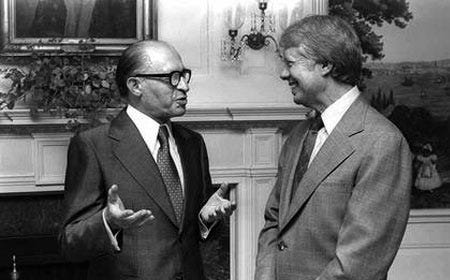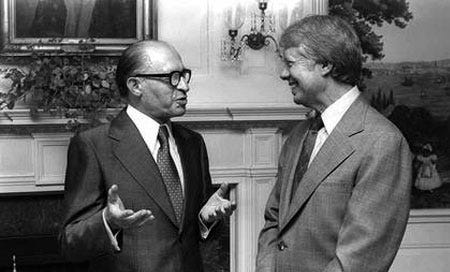
Among many other time-tested attributes, the Jewish people have a long memory. Aid us in the manner of the ancient Persian King Cyrus, and we will remember you forever fondly. Cross us as Seleucid King Antiochus IV did, and we will curse you every Hanukkah. Our talent for remembering is particularly salient today after the death, at the age of 100, of former President Jimmy Carter. While the rest of the world is now hailing him as a statesman who, after his failed one-term presidency, rose to become an unstinting peacemaker, a Nobel Peace Prize winner, and a paragon of now nonexistent virtues, many Jews will have a far more ambivalent reaction. The man whose legacy could have been cherished by future Jewish generations, with streets in Jerusalem named for him and communities created in his honor, will be at best forgotten, if not reviled. That is the tragedy of Jimmy Carter, a leader who could have gone down in Jewish history as a second Truman, will be recalled, if at all, as another Bernie Sanders.
The tragedy is compounded by the fact that the Jewish state owes Carter an immense historical debt. In an anomalous way, his insistence on including the Soviets in the Middle East peace process immediately after Egypt succeeded in evicting them, convinced President Anwar Sadat of the need to act swiftly and independently of the United States. The result came in November 1977, with Sadat’s groundbreaking visit to Israel. Carter, to his credit, leapt into the diplomatic breach and devoted 13 presidential days to forging the Camp David Peace Accords between Egypt and Israel. Though never close to yielding a warm peace, that treaty has since withstood tectonic pressures and relieved Israel of the threat of large-scale Arab armies.
But, sadly, that achievement proved to be a one-off. The self-proclaimed champion of human rights, Carter was comfortable with Middle Eastern dictators like Sadat, Hafez al-Assad, and the Shah of Iran, but endlessly critical of Israel’s democratically elected leaders, beginning with Menachem Begin. No sooner were the Camp David Accords signed, in 1979, than Carter embarked on a forty-year smear campaign against Israel. In my meeting with him several years after the ceremony, Carter insisted that Israel was violating UN Resolution 242 by not withdrawing to the pre-Six-Day War boundaries and failing to create a Palestinian state. My assurances that the resolution specifically voided the return to the indefensible 1967 borders and made no mention of the Palestinians, much less of a state, were righteously rejected.
From a mere misreading of 242, Carter descended into a dark obsession with Israel, casting it as the source of all Middle Eastern instability and a world-leading violator of human rights. His 2004 book, Palestine: Peace Not Apartheid, though based on half-truths and outright lies, effectively legitimized Israel’s delegitimization. Yet, while reviewing the book for the Wall Street Journal, what shocked me so profoundly was Carter’s not-so-subtle antisemitism. He lambasts secular Israelis for abandoning Jewish law and condemns national religious Jews for fulfilling it. Whether right-wing or left, Jews can do no right by Jimmy Carter. The one-time peanut farmer from Georgia who spent a lifetime repenting for his earlier racism against Blacks, conveniently forgot that the KKK also murdered Jews.
Yet Carter wasn’t satisfied with merely libeling Israel. His final decades were devoted to whitewashing Hamas and presenting it as an organization opposed to terror and dedicated to peace. That was the message he conveyed on the op-ed pages of the New York Times and in public appearances worldwide. While shunning meetings with Israeli leaders, he embraced Khaled Mashal, Ismail Haniyeh, and other terror chiefs. He supported the Goldstone Report that condemned Israel for committing war crimes during the 2008-2009 conflict with Gaza and accused Israel of systematically starving Gaza’s civilian population. The terrorists’ attempts to bore under Israel’s border were, in Carter’s telling, “defensive tunnel[s] being dug by Hamas inside the wall that encloses Gaza.”
Sanctimonious and prideful, Carter was never popular among his successors, Democratic and Republican alike, who generally shunned him. A story told to me by an Israeli official who participated in the Camp David talks summed up the reasons for this aversion. Visiting Israel in the eighties, well after Menachem Begin’s resignation and physical decline, Carter asked this official to arrange a phone call. The conversation lasted a few minutes, at most, the ex-official told me, during which Carter talked endlessly and Begin said nothing. That did not prevent Carter from immediately going to the press and reporting on how he and Begin had discussed the peace process and other Middle East affairs. “It was a total lie,” the official told me. “A fiction.”
That, unfortunately, is how many Israelis will remember Jimmy Carter—a person for whom the truth, especially about Israel, was easily discounted. A person who expressed not the slightest gratitude for the Israeli medical technology that successfully treated his melanoma or for the Israeli prime minister who assured him, inaccurately, “that you've inscribed your name forever in the history of...the people of Israel.” Not a Cyrus nor a Truman, in the end, Jimmy Carter, but a Nebuchadnezzar who befriended Haman.




Excellent article to counter the tidal wave of inane praise for this failed President with disgraceful morals.
Missing only a picture of Carter posing with Hamas leader Ismail Haniya:
https://substack.com/home/post/p-153779247
PS perhaps true justice that Carter lived long enough to see Donald Trump, Israel's great and proven friend, reelected in one of the greatest political comebacks in American history.
Jimmy Carter was a simple Southern peanut farmer who was sanctimoniously anti- Israel just like Obama. As a Jew myself, it still mystifies me how Jews could vote for him, Obama, Biden and Harris.